Infertility treatment at private clinics is the only way to parenthood for many couples in Albania. However, this treatment comes with substantial financial and emotional burdens.
Ilda Hoxha
For Albana, the desire to become a mother surpassed all else. Living in Durrës, she endured years of consecutive cycles of infertility treatment at private clinics in Albania.
‘In the early years, I found each unsuccessful attempt emotionally challenging,’ she said, adding that as time went on, she persisted with the routine despite the diminishing odds. ‘It looks like a process of drug addiction,’ explained Albana. “You save up for another round of fertilization, hoping that this time luck will be on your side’ – she added.
Every year in Albania, hundreds of couples turn to private clinics and hospitals offering in-vitro fertilization in their quest to become parents. Data collected by Faktoje.al through an online survey indicates that only a fraction achieve success, amidst financial costs that can soar into tens of thousands of Euros.
‘It’s costly and there’s no guarantee,’ she remarked. ‘In addition to paying the hospital or clinic for each procedure, you also have to buy medications and stimulatory injections,’ Albana explained.
According to INSTAT, the average age of the population rose to 38.8 years in 2023. Medical professionals observe that an increasing number of couples are delaying parenthood until their 30s or later, prioritizing career development. Consequently, many women face challenges in achieving pregnancy and a heightened risk of miscarriage.
‘In our daily clinical experience, we’re seeing more cases where couples, especially women, are in their advanced reproductive years,’ noted Marsel Haxhia, a certified clinical embryologist, highlighting that infertility affects approximately one in six couples of reproductive age.
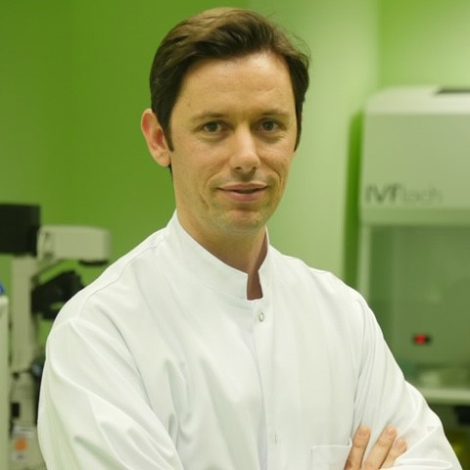
Marsel Haxhia, embryologist
In-vitro fertilization (IVF) stands as one of the most successful techniques in assisted reproduction, widely available in private hospitals and clinics across Albania.
According to data gathered by Faktoje.al through surveys on the ‘Engaged Community Reporting’ (ECR) platform, which involved women and some cases of men whose partners underwent fertilization procedures, 64% of respondents pursued treatment in Albania. This underscores the growing prominence of this field within our country.
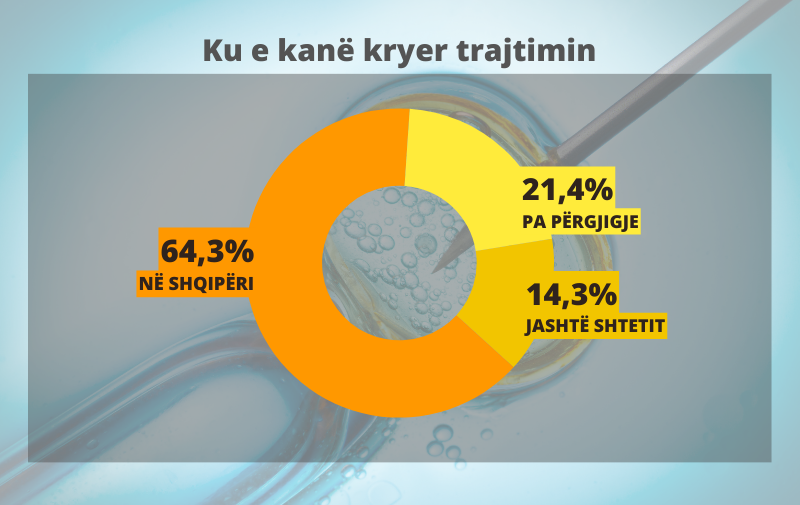
According to survey responses, over 71% of the women undergoing in-vitro fertilization treatment were aged between 35 and 45 years, with 25% being over 45 years old. The data also revealed that more than half of the participants (54%) underwent one, two, or three cycles of fertilization. In terms of expenses, 25% of the respondents reported spending between 4,000 and 6,000 Euros on fertilization, while 18% spent between 8,000 and 15,000 Euros. Additionally, 29% spent over 15,000 euros, while the remaining respondents did not disclose their financial information.
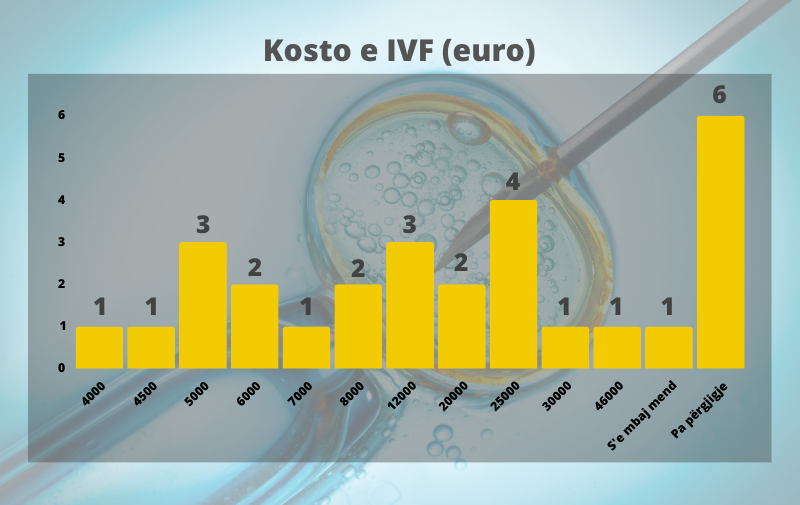
Dr. Marsel Haxhia explained to Faktoje.al that in-vitro fertilization procedures typically cost between 4,000 and 5,000 euros per cycle, including all necessary medications.
‘The success of in-vitro fertilization isn’t guaranteed, and after 2-3 unsuccessful attempts, it’s crucial for couples to understand the underlying reasons,” he emphasized.
‘n-vitro fertilization requires precise laboratory conditions for embryo development, which contributes to its associated costs,’ Haxhia elaborated.
Luli’s journey with in-vitro fertilization resulted in success. The woman gave birth to twins in 2020 following an unsuccessful procedure. She, a 42-year-old, revealed that the cost of in-vitro fertilization for both treatments and medications amounted to 15,000 euros.
‘We decided on IVF due to our test results indicating limited ovarian reserve and male infertility,’ she explained. ‘Both my husband and I underwent treatment, with the first round completed between 2017 and 2018, and the second in early 2019.’
Luli clarified, ‘Both procedures took place in Albania and in two other countries,’ highlighting that the second procedure yielded successful results. ‘The two embryos were implanted, both thrived, and in January 2020, I welcomed two healthy children into the world,’ shared the mother of the twins.
Embryologist Marsel Haxhia mentioned that the success rate in in-vitro fertilization can go up to 70%.
‘The success rate for in-vitro fertilization ranges from 15% to 70%, which clearly shows the variability depending on several factors,’ he explained.
‘Each couple’s success rate is closely tied to their specific issues, but it also depends on the expertise of the medical team involved,’ Haxhia emphasized.
In-vitro fertilization and its potential risks
Doctors explain that in-vitro fertilization (IVF) is an Assisted Reproductive Technology (ART) technique involving the retrieval of eggs from a woman’s ovaries and their fertilization with sperm outside the body.
Infertility is defined as the inability to conceive (regardless of the cause) after 1 year of unprotected intercourse for women under 35 years old, and after 6 months for women over 35 years old.
Anisa Ajdini, a specialist in obstetrics and gynecology specializing in infertility treatment, emphasized in an interview with Faktoje.al that infertility is a challenge affecting both partners. Hence, infertility is not solely attributed to the woman, as is often assumed in many cases.
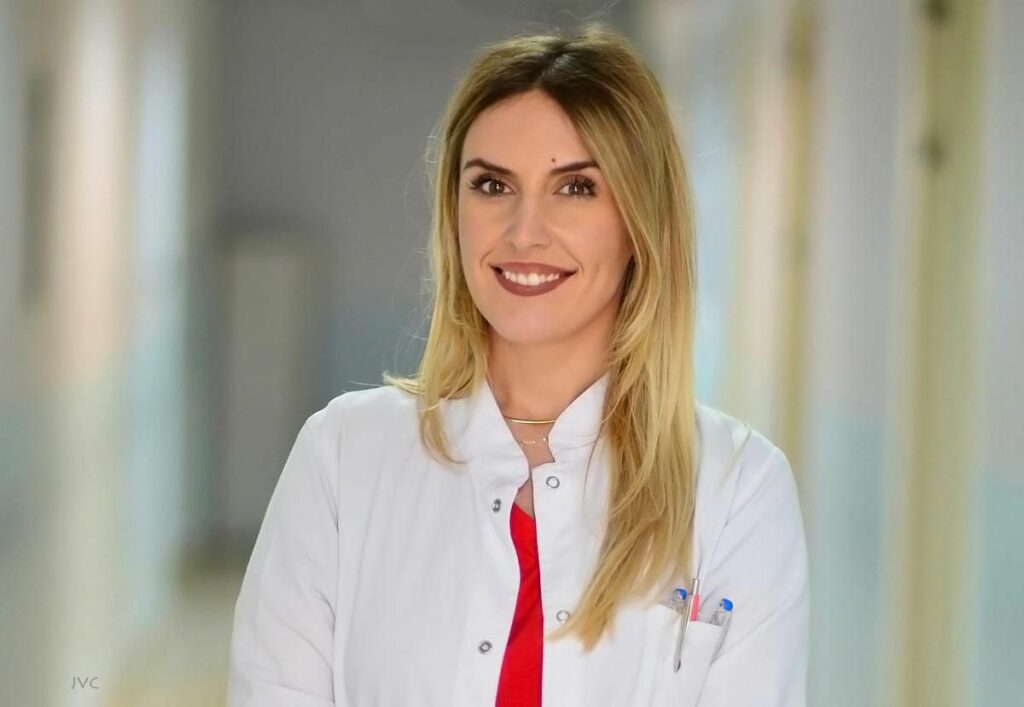
Anisa Ajdini, a specialist in obstetrics and gynecology
‘It’s highly important to consider the male’s evaluation as well. Once we gather all necessary data from laboratory tests and ultrasound examinations, we can recommend various techniques to patients, starting from simpler options like timed intercourse to more advanced procedures such as in-vitro fertilization,’ she argued.
She highlighted an increasing trend of couples opting for in-vitro fertilization, noting sadly that women are experiencing difficulties conceiving naturally at younger ages.
‘Previously, couples over 35 predominantly pursued in-vitro fertilization due to natural declines in egg quantity and quality,’ she elaborated.
‘Nowadays, we’re seeing infertility issues in women as young as 25,’ Ajdini added.
How likely is it for children conceived through in-vitro fertilization to be born with problems?
‘I see many people who are concerned about the health of the child. It’s important to understand that we’re dealing with the genetic material of the couple. The pregnancy that would naturally occur inside the woman’s body is now happening outside. It’s the same egg, the same sperm, and the same DNA that we use for in-vitro fertilization. Therefore, the chances of having a child with problems are similar to those of a natural pregnancy for this couple.’
Additionally, in-vitro fertilization carries its own risks, especially for patients who have experienced serious illnesses.
‘We also have patients with other medical conditions. There may be patients with a history of breast cancer or hormonal disorders, where the high-dose hormonal stimulation we administer could worsen their quality of life and potentially reintroduce diseases that have posed risks to them,’ the specialist emphasizes.
Gynecologist Eglantina Dema recommends that specialists thoroughly assess the couple before recommending in-vitro treatment.
‘I strongly believe that as gynecologists, we should conduct a comprehensive evaluation of the couple to exclude all illnesses and potential barriers to fertility treatment, keeping in-vitro as a last resort,’ she states. ‘Therefore, we should not rush patients into in-vitro procedures,’ Dema concludes.
Where did the promise for in-vitro fertilization in the state stand?
In May 2023, Ogerta Manastirliu, then Minister of Health, declared that within the year, in-vitro fertilization would be offered for free to patients at the ‘Koço Gliozheni’ maternity hospital. However, despite the promise, the service was not provided last year.
Meanwhile, the Ministry of Health officially informed Faktoje.al that in February, the first case of in-vitro fertilization was performed at the ‘Koço Gliozheni’ maternity hospital, and according to this institution, this service is offered for free to citizens referred by their family doctor.
‘In-vitro fertilization, a new service in public healthcare as a health policy for couples facing reproductive difficulties, was established at the ‘Koço Gliozheni’ Obstetrics and Gynecology University Hospital following an investment in infrastructure, equipment, and reorganized human capacities. The ‘Koço Gliozheni’ Obstetrics and Gynecology University Hospital has established the first national public center for assisted reproduction techniques,’ the Minister said in a written response.
‘In February 2024, the first assisted reproduction procedure was performed, and 10 procedures were completed,’ she added.
Doctor Marsel Haxhia suggests that patients should receive support from the state for in-vitro fertilization, and then they should decide where they want to undergo the procedure.
‘For many years, this procedure has only been offered in the private sector, and only last year there seems to be an effort to perform it in state hospital. In my opinion, considering the specificity and delicacy of the procedure, patients should have a portion covered, and they can choose where to have it done. This is a model that operates in many countries around the world and even in neighboring countries with similar economic strength,’ suggests embryologist Haxhia.
Anisa Ajdini, a specialist in obstetrics and gynecology for infertility treatment, mentioned that there is a list of criteria in state hospitals for patients to qualify for this service.
‘In-vitro has been under discussion for some time regarding its implementation in public hospitals, and as far as I know, it is still in its early stages. I believe they will announce a set of criteria for accepting patients, similar to what is done in Europe,’ she said.
Gynecologist Eglantina Dema reveals that there have been instances where couples have sold their homes to afford in-vitro fertilization, as the procedure is costly.
‘In Albania, these in-vitro payments are not covered by insurance and are entirely private and personal. After several attempts, it becomes an obsession for the couple to achieve this, and they have even gone as far as selling their homes to undergo the procedure,’ the doctor explained.
Recently, the Ministry of Health has drafted a bill ‘On Sexual and Reproductive Health’ aimed at guaranteeing the sexual and reproductive rights of individuals. However, even though in-vitro fertilization is part of this bill, it does not specify how couples who cannot conceive will be supported.
This is confirmed by Zheni Gjergji, Chairwoman of the Health Commission, who states that the bill does not provide any assurance regarding in-vitro fertilization services in public hospitals and clinics.
‘It is a law drafted for both public state services and private ones, but without a special focus on state-provided and free services,’ she told Faktoje.al.
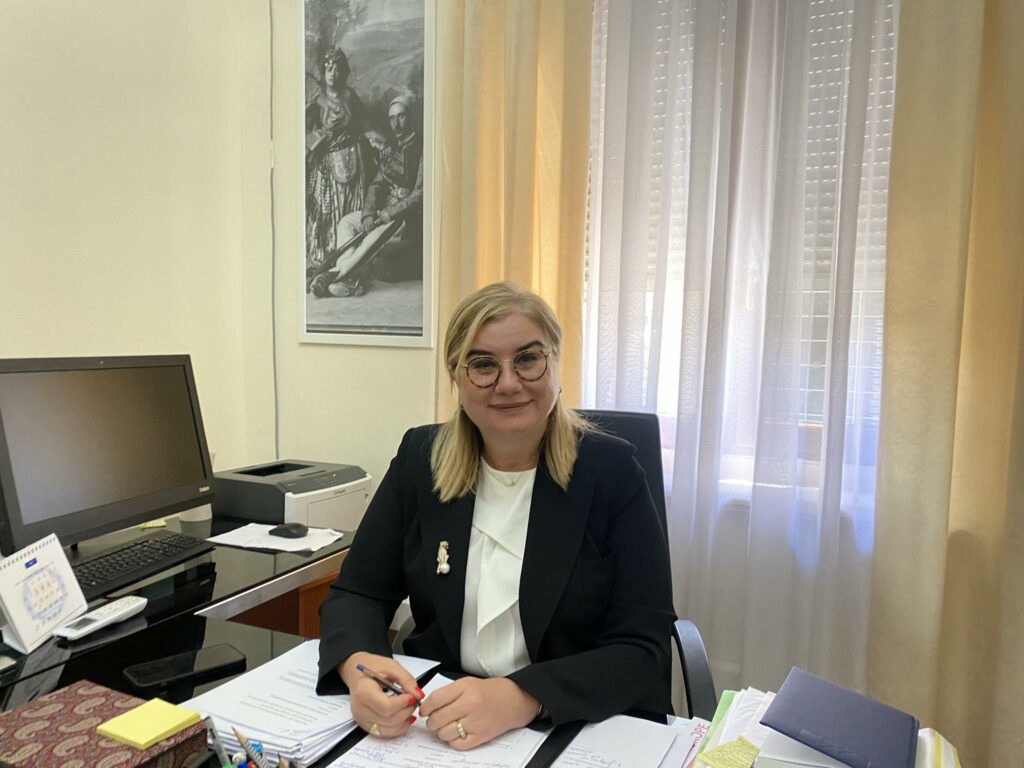
Zheni Gjergji, Chairwoman of the Health Commission
Gjergji pointed out that Albania does not have data on the number of couples facing conception issues. However, based on figures from neighboring countries, it is estimated that about 22% of the reproductive population is affected.






